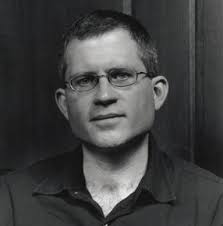
Christian Wiman, former editor of Poetry magazine and a poet himself, has been there and back. Not just the highs and lows that come with the life of a poet who gets hosannas one second (via acceptances) and brickbats the next (via rejections), but the more soul-searching variety—the one that comes with cancer, bone marrow transplants, and an arduous journey back.
I say this by way of explanation. Wiman’s new collection of essays are about poetry, yes, but they are also about art as faith (and faith as art). Thus, the subtitle in his new book He Held Radical Light: The Art of Faith, The Faith of Art. Thus the reason Wiman walked away from one of the most prestigious editorships for other callings: art, love, faith coming in the form of writing, marriage, and Yale Divinity School (how’s that for a career shift of a higher order?).
The mix of art and faith, so seldom seen together in these troubled times (unless you’re in a museum or Florence, say), makes for a bracing read. And Wiman does not go wild with add-in poems by way of example—either his own or others’—instead choosing to fine tune his own prose voice by choosing support more selectively: the poets and the poems who have spoken to him on a transcendent level.
Who are these poets? They are A. R. Ammons (circular, as he appears at both beginning and end), Donald Hall, Mary Oliver, Craig Arnold, Susan Howe, Denise Levertov, Jack Gilbert, Wallace Stevens, and Mark Strand (among others). Of this lot, I’d yet to meet Ammons and Arnold, but all that’s changed now, which is the beauty of reading books—they create a new you under the currency of change.
First, though, Wiman tackles himself, namely his youthful confidence that a poem could be written that would outlast him forever (meaning: enter the annals of eternity). He no longer believes this. Even Shakespeare will face a time when there are no eyes to feast on his lovely pentameters, Wimar reminds us.
A quote I liked: “Poetry itself—like life, like love, like any spiritual hunger—thrives on longings that can never be fulfilled, and dies when the poet thinks they have been.”
In addition to the poetry and the philosophy, there’s a rich vein of memoir running through this little book. Wiman recalls, for instance, reading poems sent to Poetry in Herculean 8-hour shifts. He writes, “An editor…especially one responsible for a monthly magazine, and especially one whose literary predispositions are, let us say, snarlish, quickly discovers that if complete critical approval is the only criterion for inclusion, then either he or the magazine is going under. I became a different kind of reader.
“I started out as a poet believing that greatness will out, as it were, that fate will find and save the masterpieces from oblivion no matter what. A decade of standing in that aforementioned storm, as well as making my way through the collected works of just about every American poet of note for the Ruth Lilly Prize for lifetime achievement, has convinced me otherwise. Chance and power play a large part, and I feel sure that some genuinely great things fall through the cracks—forever.”
Wow. Your suspicions (and mine) affirmed! And even though you may be kidding yourself, you can’t help but believe that some of your stuff is some of that stuff. You know, the sterling silver being rejected as flatware. Through cracks the size of the Grand Canyon. In a cold, cruel poetry world where Chance and Power share the throne with an iron fist like Ferdinand and Isabella.
Starting tomorrow, I’ll share a few of my favorite poems among Wiman’s favorite poems. And continue writing for the cracks. Until then….
